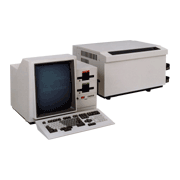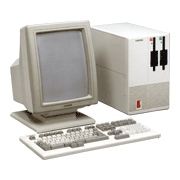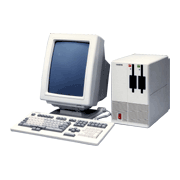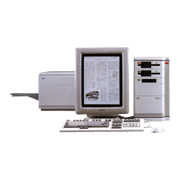At the time, this was the Fujitsu's top-end Japanese language word processor. It was announced in November 1982 as the top end model of Fujitsu's first word processor, the OASYS 100 (announced in May 1980). This machine had the following features:
(1) A large 17-inch vertical display capable of full-screen display of A4 documents (48 char. x 65 line display)
(2) A laser printer capable of 40x40 dot high-quality, high-speed printing (10 sheets per minute for A4 documents) was standard equipment.
(3) In addition to the previous automatic ruled line function, the system had illustration capability to enable drawing of figures such as lines, circles and rectangles.
(4) In addition to enlarged and reduced characters, the system had a variety of new document creation capabilities, like subscripts/superscripts and shading.
In the 5 years from 1980 to 1985, Japanese language word processors dropped to about 1/10th their original price (1980: 2 million yen, 1985: 164,000 yen). On the other hand, models developed as high-end business machines focused on document processing capabilities, high-speed printing and ease-of-use. In order to achieve more sophisticated document creation (as mentioned above), this machine used an Intel 16-bit MPU (86 family) instead of the previous 8-bit MPU. A laser printer capable of high-quality, high-speed printing was developed for this machine. The printer was more expensive (2.5 million yen) than the OASYS 100G main unit (1.7 million yen), and was extremely heavy, with a weight of 88kg.
Later, Fujitsu developed other machines in this series, including: the OASYS 100GS, which featured a new component-based design with separate display and keyboard, and a display with swivel mechanism; the OASYS 100GX which used a 24 dot display and white CRT for better visibility and less eye fatigue; and the OASYS 300A which used a 32-bit MPU for higher speed, and was equipped with electronic publishing (EP) capabilities.
The Japanese language input system evolved from the simple word conversion type used in the early models, to automated kana-kanji conversion and phrase conversion in the OASYS 100GS, and further to compound phrase conversion in the OASYS 300A.
| Model | OASYS 100G | OASYS 100GS | OASYS 100GX | OASYS 300A Model 45 | |
|---|---|---|---|---|---|
| Announcement date | November 1982 | May 1984 | February 1986 | August 1988 | |
| Input system | Interactive kana-kanji conversion | Interactive kana-kanji automatic conversion, phrase conversion | Interactive kana-kanji automatic conversion, phase conversion and compound phrase conversion | ||
| Keyboard | Thumb shift keyboard or JIS layout keyboard (both equipped with numeric keypad) | Thumb shift keyboard or JIS/New JIS layout keyboard (both equipped with numeric keypad and mouse capability) | |||
| Display | Type | 17inch vertical green graphic CRT | 14inch vertical green graphic CRT | 16inch vertical white graphic CRT (capable of inverted black/white display) | 17inch vertical white graphic CRT (capable of inverted black/white display) |
| Number of characters | 48char x 65line (16dot display) | 48char x 63line 246dot display) | 48char x 65line (24dot display) 72char x 68line (16dot display) |
||
| Floppy disk | 5inch x2 (one for dictionary, one for documents) | 5inch (3.2MB) x2, 3.5inch x1 | |||
| Hard disk | x1 for system | x1 for system | x1 for system and documents (document memory capacity: 1,100 A4 pages) | x1 (51MB) for system and documents (document memory capacity: 2,000 A4 pages max.) | |
| Main printer | Laser type, max. 40x40dot, 10sheet/min (A4 size), B4 size, 2 level cassette paper feed system (250sheet/cassette) | Laser type, 480dpi, 12sheet/min (A4 size), A3 size | |||
| External dimensions(*) and weight | Main unit | 550x480 x470, 43kg |
210x400 x340, 18kg |
210x400 x340, 18.2kg |
240x470 x430, 21.0kg |
| Display | (Integrated with main unit) | 280x340 x396, 8kg |
320x350 x460, 15.8kg |
350x379 x493, 18.8kg |
|
| Keyboard | 510x230 x65, 3.5kg |
486x205 x35, 3kg |
486x205 x35, 3kg |
486x205 x45, 1.9kg |
|
*: WxDxH, units mm
(Note) The above specifications are from the time of announcement, and may have been changed due to later improvement





